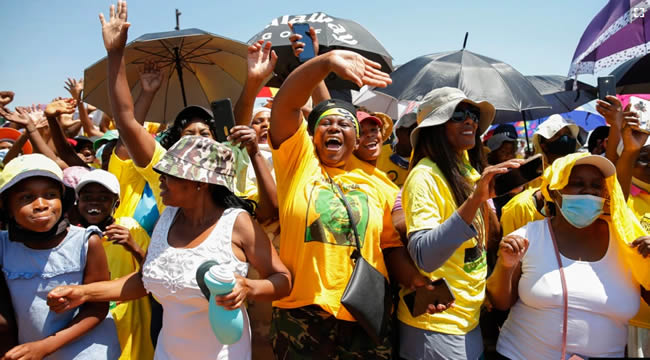
A floundering economy, party in-fighting and ceaseless corruption allegations are plaguing South Africa’s ruling African National Congress. The nationwide local elections on November 1 will test whether loyalty to the party that brought an end to apartheid will prevail or shift in favor of a new political order.
In the neighborhood of Kliptown, Soweto, the late Nelson Mandela and others laid the foundation for the country’s democracy.
Now, nearly 30 years since the end of apartheid, the public housing that provided shelter to Mandela’s followers are crumbling.
As residents prepare to elect new mayors and city councils, they say they’re weighing the legacy of Mandela’s ruling African National Congress.
Some, like Shayne Biggers, are venting frustration.
“They [are] doing nothing for us. Absolutely nothing. As you can see how this place looks, as you can see, they’re nothing, nothing. I’m very angry, said Biggers. “Even if I see those people still campaigning, I think for myself, ‘Why must we still go and vote? Why must we go vote, because nothing [is] being done for our place here’.”
South Africa’s municipalities are in crisis, with many local governments insolvent and unable to deliver basic services like water and sanitation.
Years of disappointment may lead people to not vote at all.
For those who do turn out, there is no obvious favorite among the more than 300 parties and independent candidates.
Roland Henwood is a political scientist at the University of Pretoria.
“This is a very difficult election to call, probably the most difficult election to go since ‘94. The levels of mismanagement and corruption are staggering. And this is mostly something that can be put in front of the ANC. And that is why the levels of dissatisfaction, levels of disillusionment, are staggering,” said Henwood.
The past year has brought the country’s challenges to a peak.
A national inquiry into graft under former President Jacob Zuma revealed testimony of rigged tenders and kickbacks — which cost the public millions of dollars.
Meanwhile, economically stifling lockdowns saw the unemployment rate soar to 34 percent.
This scenario gives confidence to new opposition parties.
Herman Mashaba leads ActionSA, formed only a year ago.
“COVID-19, as bad as it was, it actually exposed the deep-rooted criminality of [the] ANC. It exposed the deep-rooted corruption element of the ANC. So, people are wide awake. We’re going to mobilize South Africans, use our democratic right of voting them out, to ensure that we can have a prosperous South Africa,” said Mashaba.
But life-long party members who attribute their freedom and right to vote to the ANC remain loyal.
Sifiso Khanyile is among the party faithful. “I can say let’s give them a chance, ma’am, one more chance. They will put this one through. They have to put people first now than themselves. If they can do that, this country will go forward without any hassle and hesitation,” said Khanyile.
On November 1, South African voters will show whether they believe the ANC can still bring reform, or whether it is time to give the opposition a chance to bring positive change.
Source: voanews.com























